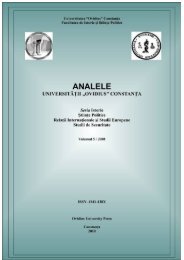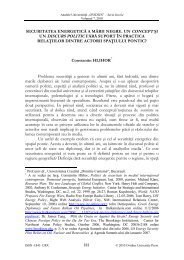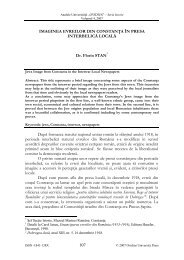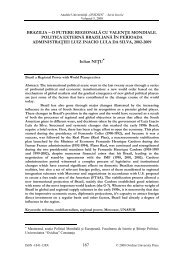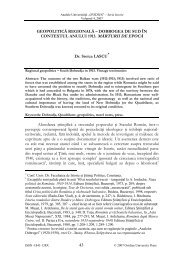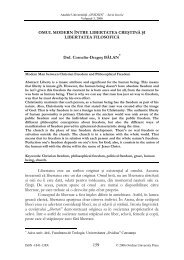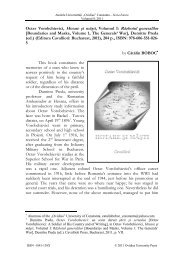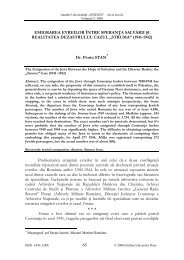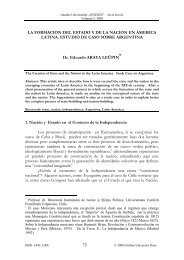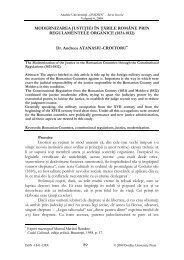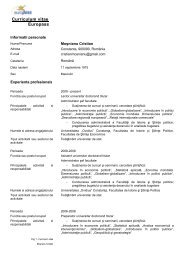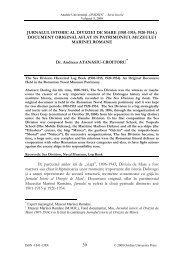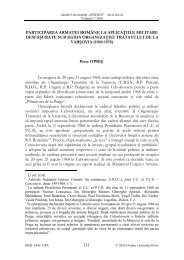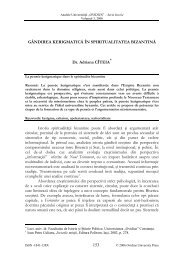analele universitÄÅ£ii âovidiusâ constanÅ£a - AUOCSI
analele universitÄÅ£ii âovidiusâ constanÅ£a - AUOCSI
analele universitÄÅ£ii âovidiusâ constanÅ£a - AUOCSI
Create successful ePaper yourself
Turn your PDF publications into a flip-book with our unique Google optimized e-Paper software.
Nicolae Iorga’s Opinion on Early Modern Scotland Analele Universităţii „OVIDIUS” / Vol. 6/ 2009<br />
“Scottish reaction, the influence of the North on the Southern England,” 9 in order<br />
to explain the political changes that took place after the reign of Elizabeth I.<br />
The “pedantic James I, son of Mary Stuart, a man bred in a narrow<br />
Calvinist environment, a limited and though spirit,” 10 which “instead of thinking<br />
of a pleasant literature… thinks before all on how a king should be. The very<br />
Greek title of his book… shows that the king must above all be according to the<br />
Bible.” 11 Also he gives James I the credit that he “deduced this idea of royal<br />
autocracy from a system, while Charles understood to apply it according to his<br />
fastidious character.” 12<br />
In regards of Charles I of England, Nicolae Iorga depicts his failure in<br />
courting a Spanish princess, which “undoubtedly lays upon a man and upon an<br />
era an air of ridicule.” 13 Then, the French princess he took was not considered a<br />
good influence by the “puritans, who would not get along with the Church of<br />
England, which was neither protestant, nor did it keep the Roman Catholic<br />
mysteries.” 14 Needless to say, her “taste for parties, light and generous spirit,<br />
religious indifference, affinity for Catholic pump, was not allowed in the harsh<br />
and northern Scottish England of her father-in-law.” 15 The concept of a “harsh<br />
and northern Scottish England” fits the motto of the present article, and will<br />
receive further attention.<br />
According to the same historian, the Scots needed “somebody frowned,<br />
who talks little, always pronouncing the sentence of acquittal or conviction, with<br />
God’s scales before, upon which the sins of the world are weighed.” 16 By waging<br />
war against Parliament and losing, Charles I was sold by the Scots to the<br />
English, as they “proved to have exceptional commercial skills.” 17 It is<br />
superfluous to remark that this phrase of Nicolae Iorga has a deeper meaning.<br />
The distinguished Romanian scholar adds that the judgment of the Scots<br />
who sold Charles I and that of the English who executed him was the same:<br />
“«We do not judge His Grace as humans; but we judge him as good sons of<br />
God, as he breaks the rules of the revealed book, the Bible». And that is how<br />
this tragedy of Charles I must be understood. And those people did not have<br />
any moment of doubt, they did not feel sorry afterwards. They went home<br />
pleased, raising a prayer to God for they had voted their King’s death. […] This<br />
is how the Bible introduces a notion of human liberty, protected by God,<br />
against human error and gives the image of a republic dominated by something<br />
9 Ibidem.<br />
10 Idem, Oliver Cromwell…, p. 8.<br />
11 Idem, Evoluţia ideii de libertate, p. 241.<br />
12 Ibidem, p. 242.<br />
13 Idem, Oliver Cromwell…, p. 8.<br />
14 Ibidem.<br />
15 Idem, Evoluţia ideii de libertate, p. 241.<br />
16 Ibidem.<br />
17 Idem, Oliver Cromwell…, p. 8.<br />
ISSN -1841-138X 209 © 2009 Ovidius University Press



